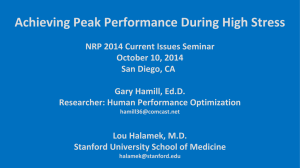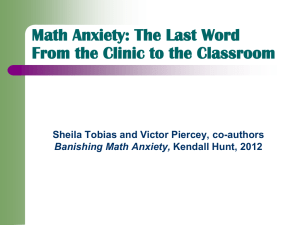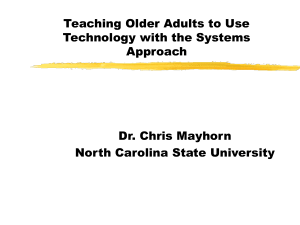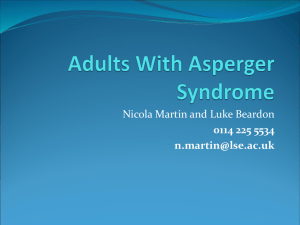A Brain-Based Peak Performance Model Using Meditation, EMDR
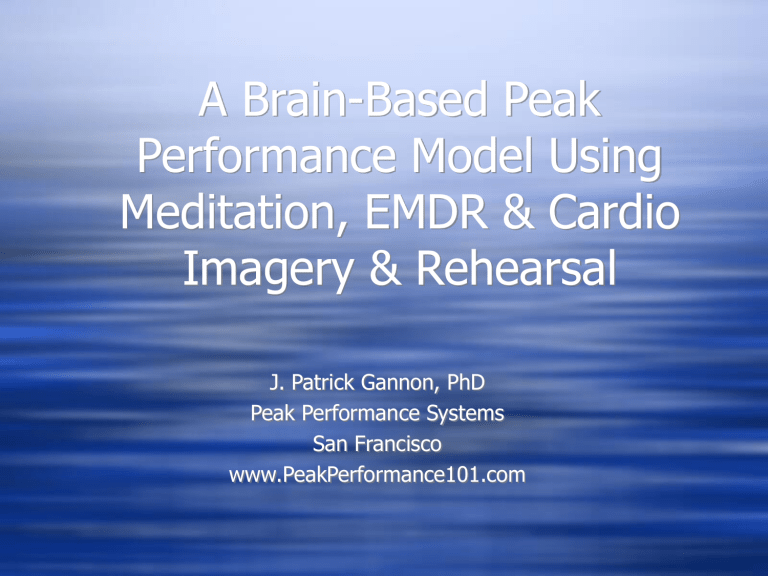
A Brain-Based Peak
Performance Model Using
Meditation, EMDR & Cardio
Imagery & Rehearsal
J. Patrick Gannon, PhD
Peak Performance Systems
San Francisco www.PeakPerformance101.com
Background To Study
Clinical practice working with performance issues over 10 years
Personal experience as college athlete, tennis coach, public speaker, trainer
Developing knowledge in neuroscience, exercise physiology, meditation, state dependent learning, dissociation
Exploratory Study of Small
Sample of Performers
Singers
Musicians
Public Speakers (2)
Job Seekers (2)
Purpose of Study
Test 3 brain-based peak performance tools on various performance measures
Can we “imprint” new learning in brain?
Can we bypass old neural circuits that hold anxiety and “install” new circuits?
Can we install elements of Flow state?
Can we “BrainScript” new performance routines that redefines peak performance training?
Traditional Sport/Performance
Psychology Tools
Relaxation
Goal Setting
Visualization/Imagery
Self-Talk
Concentration/Focus
Limitations of Traditional Peak
Performance Training
Creative arts performers (not athletes) often overlook performance skills in lieu of practicing their craft
Research suggests only half benefit from psychological skill training when used.
Why?
Training is not “state dependent”--skills learned in non-performance situations do not always “cross over” into performance
Hypothesis: Performance anxiety blocks execution of newly learned skills
Performance Anxiety
Anxiety includes trait anxiety
(personality) plus state anxiety
(situational) which interacts to create intensity of performance anxiety
PA is biggest barrier to peak performance
PA has a “long tail” - back to childhood trauma and past performance failures
Must be clinically treated first using
EMDR, before peak performance scripts can be installed
Performance Stress Triggers
Hardwired Survival States
PA triggers/consequence of hardwired selfpreservation instincts such as “fight/flight” response
Evolutionary psychology has identified three other survival states: freeze, fright and faint.
Sequence: Freeze, Flight, Fight, Fright, Faint
Is there a sixth “F”?
Flow?
Study of British Conservatory
Students (Gruzelier, Egner &
Vernon, 2003-06)
Random assignment, coaches’ blind ratings of performance following one of six interventions: three brain states (alpha/theta, sensory-motor response and Beta1), exercise, mental skills or Alexander Technique
Results: only alpha/theta brain state training using neurofeedback showed significant performance improvement
Aerobic/Cardio Exercise
Aerobic exercise enhances neurogenesis and synaptic plasticity in hippocampus responsible for learning and memory
Exercise produces and releases neurotransmitters affecting mood, attention, perception, motivation and arousal
Exercise stimulates blood flow in brain and release of BDNF which stimulates cell growth
Neurons that “fire together, wire together”
Impact of Exercise On Anxiety
Reduction
Exercise acts as analgesic (pain relieving) and sedative (anti-anxiety)
Exercise reduces physical symptoms of anxiety
Exercise offers sense of mastery and control over challenging situations especially when combined with imagery and goal setting
Three Brain-Based Tools for
Peak Performance
Meditation/Neurofeedback
Eye Movement Desensitization and
Reprocessing (EMDR)
Cardio Imagery and Rehearsal (CIR)
Meditation/Neurofeedback
Promotes relaxation response, focused attention (concentration), mental discipline and reduces distractability
Builds resistance to stress
Promotes non-judgmental acceptance of self
Limitations of meditation and neurofeedback
EMDR
Clinical technique for PTSD, anxiety disorders, past trauma and performance anxiety
Used effectively with athletes, musicians, singers, public speakers, business and sales personnel
Triggers REM brain state allowing rapid information processing capability
Used for clearing past trauma and installing new behavioral scripts for peak performance
Cardio Imagery & Rehearsal
(CIR)
Combines aerobic exercise concurrent with mental imagery of performance
Repeated mental rehearsal of performance routines while exercising “primes” the brain to learn new performance scripts
Repeated rehearsal activates “imprinting” of new scripts which aids memorization and performance skills
Replaces anxiety scripts with mastery scripts
Method
Six session training model provided
Introduction/Assessment
Training in MM, EMDR, CIR with focus on past performance problems/trauma
EMDR installation of performance scripts
Review and re-installation using EMDR
Review CIR with pre-performance plan
Follow-up assessment
Findings
Reduced Performance Anxiety
Improved concentration, focus, mental clarity
High engagement with Content
Good execution of the performance plan
Low level of self-consciousness
Ease of experience applying skills
Internal/External Feedback positive
Discussion
BrainScripting: Proposing A New Theory of
Peak Performance Based on Neuroscience
Applied Neurogenesis & Neuroplasticity
Create new neural pathways supporting peak performance using EMDR to install performance scripts and Cardio
Imagery and Rehearsal as a “driver” of new skill learning and neural cell growth
Training in interhemispheric coherence-balancing right and left brains using three brain-based techniques
Use meditation and neurofeedback to evoke alpha/theta brainwave on demand
Install Flow states using EMDR
Workshop Promo
Performance clinic for anyone wanting to reduce performance anxiety or install performance scripts
Fill out self-assessment first (hand out)
Visit website: www.PeakPerformance101.com
For articles, videos, services and contact info


